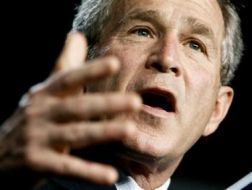US Bush says “deeply troubled” by events in Darfur
January 8, 2008 (WASHINGTON) — U.S. President George W. Bush said Tuesday he was “deeply troubled” by the unending crisis in Darfur and called for rapid deployment of an effective peacekeeping force and dialogue to end the turmoil.

He made the statement in conjunction with the third anniversary on Wednesday of the signing of the Comprehensive Peace Agreement in Sudan, which ended 21 years of civil war in that country.
“I am deeply troubled that innocent civilians continue to fall victim to the scourge of government- and rebel-led attacks in Darfur,” Bush said.
“I remain firmly committed to the rapid deployment of an effective peacekeeping force coupled with serious political dialogue between the parties to help end the crisis and the suffering of the innocent people of Darfur,” he added.
A new United Nations-mandated peacekeeping mission took over from an African Union mission on Jan. 1 in the western region of Darfur, where some 200,000 people have died and more than 2 million made homeless since ethnic minority rebels took up arms against Sudan’s Arab-dominated regime in February 2003.
The new mission, the U.N.’s largest, will eventually consist of 20,000 troops and 6,000 police and civilian personnel, but only around 9,000 troops and police are currently in place.
Relations between Sudan and the United States have long been strained, most recently over the near five-year Darfur conflict where Washington has accused Khartoum of genocide.
A U.S. diplomat and his driver were murdered on New Year’s day in Khartoum, a day after Bush signed a law aimed at piling economic pressure on the government in Khartoum.
Bush also said Tuesday that Washington remained committed with the implementation of all aspects of the Comprehensive Peace Agreement, which created a southern autonomous government in Sudan and two separate armies.
North Sudanese troops completed their withdrawal from oil rich areas of the south, a southern general said on Tuesday, heading off the latest brewing north-south crisis.
A joint defense council had given the northern troops until Wednesday to leave after they failed to meet a December 31 deadline that was part of a deal that saw southern ex-rebels return to government after resigning in October.
Their withdrawal from the unity cabinet was the worst crisis to hit the 2005 peace deal that ended Africa’s longest-running civil war. An estimated two million people were killed and another 6 million displaced in the two-decade-long conflict.
“While much progress has been made in forming a government of national unity, sharing wealth, and respecting a cessation of hostilities, many challenges remain to the agreement’s full implementation,” Bush said.
He called for efforts to ensure that a nationwide census was immediately conducted to allow national elections to be held on time next year.
“The work of Sudan’s border commission also must be reinvigorated, along with efforts to redeploy troops away from disputed border areas, to reduce the chances of a return to violence,” he said.
“The Comprehensive Peace Agreement laid the groundwork for lasting peace and unity for all of Sudan, and its vigorous application will continue to underpin U.S. involvement across Sudan,” Bush said.
(AFP)
